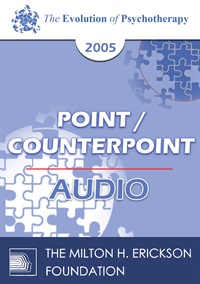EP05 Point/Counterpoint 14 - Using Hypnosis as a Lens: A States Model of Hypnosis, Problems, Solutions, and Being a Therapist - Jeffrey Zeig, PhD
- Average Rating:
- Not yet rated
- Topic Areas:
- Point/Counterpoint Sessions | Hypnosis | Phenomenology | Psychotherapy
- Categories:
- Evolution of Psychotherapy | Evolution of Psychotherapy 2005
- Faculty:
- Jeffrey Zeig, PhD | Marsha Linehan, PhD
- Duration:
- 1 Hour 19 Minutes
- Format:
- Audio Only
- Original Program Date:
- Dec 10, 2005
- License:
- Never Expires.
Description
Description:
Hypnosis is commonly thought of as a tool to enhance the therapy. It also can be used as a "lens." The phenomenology of hypnosis can help us to understand an essential aspect of the trance state, the symptom state, the solution state and the therapist's state, thereby providing new options for treatment.
Educational Objectives:
- To list the phenomenology of hypnosis.
- Given a patient's problem, provide a phenomenological description.
*Sessions may be edited for content and to preserve confidentiality*
Credits
Faculty

Jeffrey Zeig, PhD Related Seminars and Products
Jeffrey K. Zeig, PhD, is the Founder and Director of the Milton H. Erickson Foundation and is president of Zeig, Tucker & Theisen, Inc., publishers in the behavioral sciences. He has edited, co-edited, authored or coauthored more than 20 books on psychotherapy that appear in twelve foreign languages. Dr. Zeig is a psychologist and marriage and family therapist in private practice in Phoenix, Arizona.

Marsha Linehan, PhD Related Seminars and Products
Marsha M. Linehan, PhD, ABPP, is an American psychologist and author. She is the creator of Dialectical Behavior Therapy (DBT), a type of psychotherapy that combines behavioral science with Zen concepts like acceptance and mindfulness. Professor of Psychology and Director of the Behavioral Research and Therapy Clinics at the University of Washington, Seattle, WA. Her primary research is in the application of behavioral models to suicidal behaviors, drug abuse, and borderline personality disorder. She has received several awards recognizing her clinical and research contributions and is past president of the Association for the Advancement of Behavior Therapy. A fellow of the American Psychological Association and the American Psychopathological Association, Dr. Linehan is a diplomate of the American Board of Behavioral Psychology.


